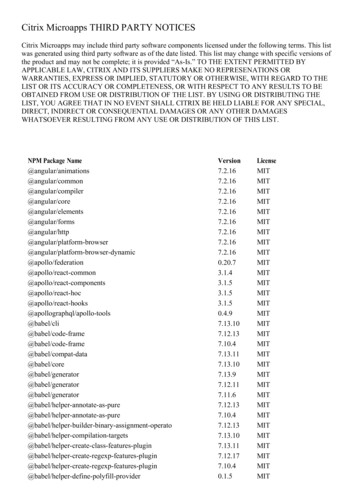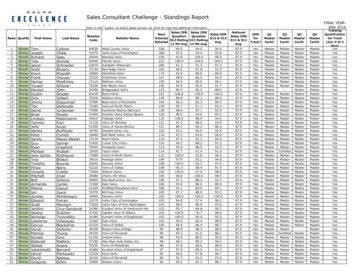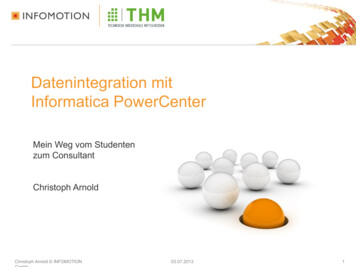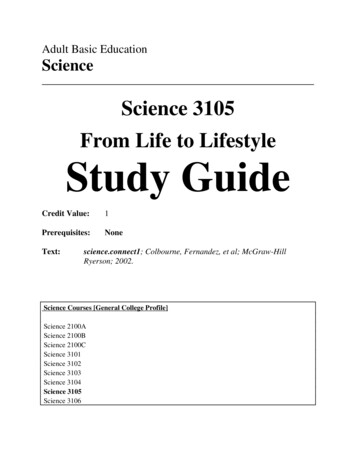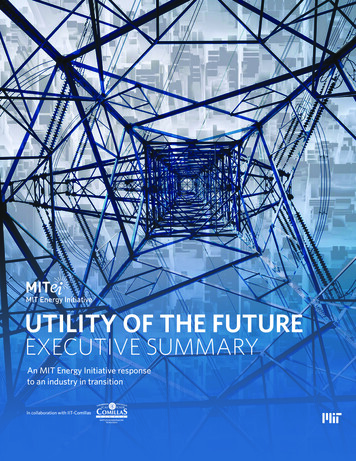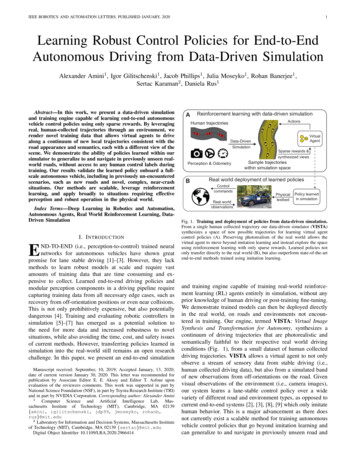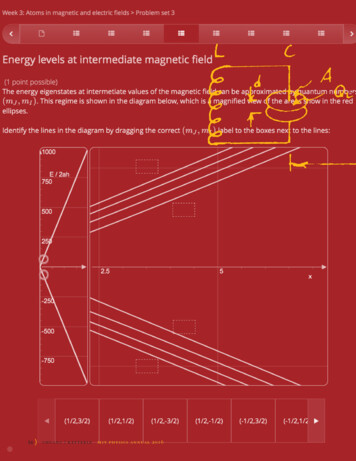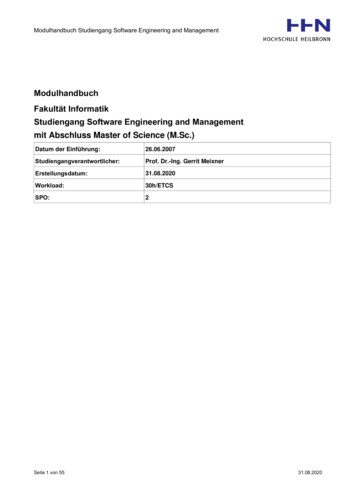
Transcription
Modulhandbuch Studiengang Software Engineering and ManagementModulhandbuchFakultät InformatikStudiengang Software Engineering and Managementmit Abschluss Master of Science (M.Sc.)Datum der Prof. Dr.-Ing. Gerrit SSPO:2Seite 1 von 5531.08.2020
Modulhandbuch Studiengang Software Engineering and ManagementÜberblick über die Module des StudiengangsSeite 2 von 5531.08.2020
Modulhandbuch Studiengang Software Engineering and ManagementModulVerantwortlichM1 Software Engineering 1Prof. Dr.-Ing. Andreas HeilM2 Engineering Application DomainsProf. Dr.-Ing. Jürgen DoneitM3 Project Management and LeadershipProf. Dr. rer. nat. Nicole OndruschM4 Software Engineering 2Prof. Dr.-Ing. Gerrit MeixnerM5 Change and Strategic Information ManagementProf. Dr. Christine ReckM6 International Cooperation in Software EngineeringProf. Dr. Nicola MarsdenM7 Master ThesisProf. Dr. Tim ReichertSeite 3 von 5531.08.2020
Modulhandbuch Studiengang Software Engineering and ManagementZiele des Studiengangs Software Engineering and ManagementAt the heart of complex, multidimensional organisations, software engineering involves more than just thedevelopment of modern information systems. Consequently, software engineers need to move beyond theboundaries of their job-specific expertise and enhance their professional profiles by acquiring managerial andinterpersonal competences. Software engineers who aim to be future business leaders should not only possesssuch multiple skills, but should be able to translate theoretical knowledge into business practices, engenderinterdisciplinary dialogues and communicate successfully in an international and intercultural environment. TheMaster program "Software Engineering and Management" has been tailored to the needs of students who areinterested in interdisciplinary approaches and seek a good foundation for their future careers.Seite 4 von 5531.08.2020
Modulhandbuch Studiengang Software Engineering and ManagementModul M1 261260 Software Engineering 1Dauer des ModulsSemesterSWS10.0PrüfungsartModulnote (ohne Prüfung) setzt sich aus gewichtetenEinzelleistungen zusammenLeistungspunkte (ECTS)10.0Voraussetzungen für die Vergabe vonLeistungspunktenModulverantwortliche(r)Prof. Dr.-Ing. Andreas HeilFachkompetenz: Wissen und Verstehen In this module we aim to provide some of the general techniquesfor the design of efficient algorithms such as randomizedalgorithms and data structures, dynamic programming, greedy aswell as graph algorithms, heuristic optimization, online and offlinealgorithms, and more.Algorithms are always embedded into larger software systems.Software Architecture is an important tool to manage large andcomplex software systems. Despite being primarily technical,a Software Architecture is the basis for identifying systemresponsibilities and to distribute work.Furthermore, students learn to study new concepts and paradigmsin software engineering by writing their own research paper ontopics like functional programming, cloud-applications, neuronalnetworks or microservies.Fachkompetenz: Fertigkeit,Wissenserschließungsee individual lecturesPersonale Kompetenz: Sozialkompetenz see individual lecturesPersonale Kompetenz: Selbständigkeitsee individual lecturesKompetenzniveau gemäß DQR7Voraussetzungen für die TeilnahmeBesonderheiten / VerwendbarkeitTerminierung im Stundenplansee individual lecturesLeistungsnachweis bei kombinierterPrüfungSeite 5 von 5531.08.2020
Modulhandbuch Studiengang Software Engineering and ManagementVeranstaltung M1.1 261261 Algorithm TheoryDiese Veranstaltung ist Pflichtveranstaltung im Modul M1Lehrveranstaltungsverantwortliche(r)Prof. Dr. Alois HeinzSemester1Häufigkeit des AngebotsWintersemesterArt der VeranstaltungVorlesung mit integrierter ÜbungLehrspracheEnglischVeranstaltungsname (englisch)Leistungspunkte (ECTS)5.0, dies entspricht einem Workload von 150 StundenSWS4.0Workload - Kontaktstunden60Workload - Selbststudium88.5Detailbemerkung zum WorkloadPrüfungsartlehrveranstaltungsbegleitend durch KlausurPrüfungsdauer90 MinutenVerpflichtungPflichtfachVoraussetzungen für die TeilnahmeLehr-/Lernmethoden (Lehrformen) LecturesJoint exercises on present timesExam preparation by discussing test examsFachkompetenz: Wissen und Verstehen The students have sound knowledge of the concepts and methodsfor devising and analyzing efficient algorithms in various areas ofapplication. They have practice in deploying these methods andare able to apply them in new contexts.Fachkompetenz: Fertigkeit undWissenserschließungPersonale Kompetenz: SozialkompetenzPersonale Kompetenz: SelbständigkeitKompetenzniveau gemäß DQR7Inhalte Seite 6 von 55Randomized algorithms & data structuresDynamic programmingGreedy algorithmsGraph algorithmsHeuristic optimizationSolving NP-complete problemsOnline/offline algorithms, competitive analysisSelf-modifying data structures, amortized analysisString search, pattern matchingAlgorithmic DifferentiationNeural Networks31.08.2020
Modulhandbuch Studiengang Software Engineering and ManagementEmpfehlung für begleitendeVeranstaltungenSonstige BesonderheitenLiteratur/Lernquellen Sedgewick: Algorithms in Java, Parts 1-4 (FundamentalAlgorithms, Data Structures, Sorting, Searching), AddisonWesley Pearson Education; ISBN: 0-201-36120-5Cormen, Leiserson, Rivest, Stein: Introduction to Algorithms,The MIT Press; ISBN: 978-0262032933Recent articles from different areasTerminierung im StundenplanLeistungsnachweis bei kombinierterPrüfungSeite 7 von 55Will be published in the first three lecture weeks.31.08.2020
Modulhandbuch Studiengang Software Engineering and ManagementVeranstaltung M1.2 261262 Software ArchitectureDiese Veranstaltung ist im Modul M1Lehrveranstaltungsverantwortliche(r)Prof. Dr.-Ing. Andreas HeilSemester1Häufigkeit des AngebotsWintersemesterArt der VeranstaltungArt der Veranstaltung unbekanntLehrspracheVeranstaltungsname (englisch)Leistungspunkte (ECTS)3.0, dies entspricht einem Workload von StundenSWS2.0Workload - Kontaktstunden30Workload - Selbststudium60Detailbemerkung zum WorkloadPrüfungsartlehrveranstaltungsbegleitend durch KlausurPrüfungsdauer90 MinutenVerpflichtungVoraussetzungen für die TeilnahmeLehr-/Lernmethoden (Lehrformen)LecturesSelf-directed researchStudent presentationsCase studiesFachkompetenz: Wissen und Verstehen Students can describe the basic means of SW architectureStudents can select and apply appropriate architectural means(e.g. seperation of concerns, loose coupling, high cohesion)Students can select and apply architectural patterns, eg.microservices, MVC, client-serverStudents can describe the term "SW quality" and how it relates toSW architectureFachkompetenz: Fertigkeit undWissenserschließungStudents can document and communicate SW architectureStudents can select and use tools for SW architectur, e.g.Sonargraph, JArchitectPersonale Kompetenz: Sozialkompetenz Students enhances their presentation skills by preparing a talkabout a certain aspect of SW architectureSeite 8 von 5531.08.2020
Modulhandbuch Studiengang Software Engineering and ManagementPersonale Kompetenz: SelbständigkeitStudents can investigate tools for SW architecture and decide ontheir usefullnessKompetenzniveau gemäß DQR7InhalteWhat is SW architecture? How does it relates to SW design?Conway's lawArchitectural concepts and patterns of good (and bad) SWarchitectureArchitectural patterns, eg. microservices, MVC, pipes-and-filtersArchitectural viewsArchitectural documentationSW frameworks and product linesArchitecture in the development process (V-modell and agile)The role of a SW architect in large projectsEmpfehlung für begleitendeVeranstaltungenSonstige BesonderheitenLiteratur/LernquellenVogel, O.: Software Architecture, Springer, HeidelbergBass, L.: Software Architecture in Practice, Addison WesleyTerminierung im Stundenplansee SPlanLeistungsnachweis bei kombinierterPrüfungWill be published in first three weeks of semesterSeite 9 von 5531.08.2020
Modulhandbuch Studiengang Software Engineering and ManagementVeranstaltung M1.3 261263 Paradigms in Software DevelopmentDiese Veranstaltung ist Pflichtveranstaltung im Modul M1Lehrveranstaltungsverantwortliche(r)Prof. Dr.-Ing. Andreas HeilSemester1Häufigkeit des AngebotsWintersemesterArt der VeranstaltungVorlesung mit SeminarLehrspracheEnglischVeranstaltungsname (englisch)Leistungspunkte (ECTS)2.0, dies entspricht einem Workload von 60 StundenSWS2.0Workload - Kontaktstunden30Workload - Selbststudium30Detailbemerkung zum WorkloadPrüfungsartlehrveranstaltungsbegleitend durch praktische setzungen für die TeilnahmeProfound knowledge in fundamentals of computer sciences. Someexperience in programming concepts. General knowledge of thechallenges in the contemporary research areas in IT.Lehr-/Lernmethoden (Lehrformen)Research-based learning with regular support by the lecturerFachkompetenz: Wissen und Verstehen Fachkompetenz: Fertigkeit undWissenserschließung Seite 10 von 55Through research-based learning the students learn to acquireknowledge about the current approaches and methodologiesof diverse aspects of software development. The studentsare able to seek alternative and more suitable approachesand exploit them for solving problems related to softwaredevelopment.All students are able to understand the advantages anddisadvantages of diverse paradigms / concepts.Each student acquires in-depth knowledge of one paradigm /concept.The students are able to exploit themselves a new paradigmThe students a able to teach a new paradigm to their peergroupThey have knowledge in writing research papers (structuring,formatting, referencing, etc.)31.08.2020
Modulhandbuch Studiengang Software Engineering and ManagementPersonale Kompetenz: Sozialkompetenz Personale Kompetenz: Selbständigkeit The random distribution in teams (workgroups) enforcesteamwork abilities.Conversational skills through weekly meetings with the lecturer.Improved cognitive skills enforced by exploring, studying,comprehending, and summarizing a research topic.Improved presentational skills by intermediate presentations ofthe research progress as well as a public final presentation.Research-based learning – ability to independently study aresearch topic the students are unfamiliar with.Ability to search, identify, and analyze relevant publicationsrelated to a research topic.Kompetenzniveau gemäß DQRInhalteThe covered topics throughout the course are related to: programming paradigms (functional, reactive, distributed,logical, declarative, process-oriented, etc.) ,development philosophies / frameworks (Dev-Ops, Agile, etc.)advanced programming techniques (microservices, aspectorientation, etc.)contemporary IT concepts (Cloud Computing, Big Data,Artificial Neural Networks, Deep Learning, Model-BasedDevelopment etc.)Empfehlung für begleitendeVeranstaltungenSonstige BesonderheitenLiteratur/LernquellenPublications and books related to the research areas in the currentsession of the course.Terminierung im StundenplanLeistungsnachweis bei kombinierterPrüfungSeite 11 von 55Several deadlines for submitting the research paper in itsintermediate version. Final submission of the research paper.31.08.2020
Modulhandbuch Studiengang Software Engineering and ManagementModul M2 261270 Engineering Application DomainsDauer des Moduls1 SemesterSWS10.0PrüfungsartModulnote (ohne Prüfung) setzt sich aus gewichtetenEinzelleistungen zusammenLeistungspunkte (ECTS)10.0Voraussetzungen für die Vergabe vonLeistungspunktenModulverantwortliche(r)Prof. Dr.-Ing. Jürgen DoneitFachkompetenz: Wissen und Verstehen The students master the essential techniques of knowledge basedman machine communication, knowledge representation andmachine learning. They are able to implement the correspondingalgorithms in software, assess chances and limitations of specificapplication areas such as consumer electronics, semanticweb or natural language dialog systems. They master basictechniques to analyze mass data like text or sensor signals in aknowledge based way, i.e. develop statistical models, classify data(supervised or unsupervised) and extract the relevant information.The Real Time System unit enables the students to implementreal time relevant problems in an adapted hardware environment.They can evaluate the realtime needs, like responding time orcalculation resources.Fachkompetenz: Fertigkeit,WissenserschließungPersonale Kompetenz: SozialkompetenzPersonale Kompetenz: SelbständigkeitKompetenzniveau gemäß DQR7Voraussetzungen für die TeilnahmeBesonderheiten / VerwendbarkeitTerminierung im StundenplanLeistungsnachweis bei kombinierterPrüfungSeite 12 von 5531.08.2020
Modulhandbuch Studiengang Software Engineering and ManagementVeranstaltung M2.1 261271 Intelligent SystemsDiese Veranstaltung ist Pflichtveranstaltung im Modul M2Lehrveranstaltungsverantwortliche(r)Prof. Dr.-Ing. Gerrit MeixnerSemester1Häufigkeit des AngebotsWintersemesterArt der VeranstaltungVorlesung mit integriertem LaborLehrspracheEnglischVeranstaltungsname (englisch)Leistungspunkte (ECTS)5.0, dies entspricht einem Workload von 150 StundenSWS4.0Workload - Kontaktstunden60Workload - Selbststudium90Detailbemerkung zum WorkloadPrüfungsartlehrveranstaltungsbegleitend durch KlausurPrüfungsdauer90 MinutenVerpflichtungPflichtfachVoraussetzungen für die TeilnahmeLehr-/Lernmethoden (Lehrformen)Lectures with integrated exercises and homeworkFachkompetenz: Wissen und Verstehen In this module we try to bridge the gap between humans andmachines. Today most of our knowledge is stored in the web.Powerful machines are at our disposal and a sound theory forlogical reasoning has been developed. Putting these thingstogether we should be able to do better than just typing key wordsinto a search engine when we look for information or answers tospecific questions.The key problem is that machines are excellent in syntacticsymbol manipulation and database search, but they have no ideaof the meaning, i.e. the semantics of these symbols. Consequentlywe will investigate how to enable machines to understand humanlanguage and how to make them think in a similar way as wedo. We will thereby glimpse at fascinating fields like computerlinguistics, formal logics and semantics, knowledge representationusing ontologies, and statistical methods for machine learning.Fachkompetenz: Fertigkeit undWissenserschließungPersonale Kompetenz: SozialkompetenzPersonale Kompetenz: SelbständigkeitKompetenzniveau gemäß DQRSeite 13 von 55731.08.2020
Modulhandbuch Studiengang Software Engineering and ManagementInhalte Modelling problems with graphs, solving problems with graphsearch algorithmsNatural language dialog- and inquiry systemsAlgorithms and application domains of chatbotsNatural language processing, especially statistical methods.Foundations of information theory.Applications: Semantic Web, Information Retrieval, DataMining, Text Summarization, Machine TranslationKnowledge representation using Description Logic or FrameLogic. Inference Algorithms.Statistical methods for machine learning, prediction andclassificationLinear regression, linear discriminant analysis, decision trees,maximum likelihood estimation, EM algorithm, support vectormachines, cluster analysis, PCAEmpfehlung für begleitendeVeranstaltungenSonstige BesonderheitenLiteratur/Lernquellen Hastie, Trevor and Tibshorani, Robert (2001): The Elements ofStatistical Learning,Haugeland, John (1985): Artificial Intelligence: MIT PressRussell, Stuart and Norvig, Peter (1995): Artificial Intelligence:Prentice HallWinston, Patrick Henry (1992): Artificial Intelligence, AddisonWesleyManning, Christopher D. and Schütze, Heinrich (2003):Foundations of Statistical Natural Language Processing: MITPressJurafsky, Daniel and Martin, James H. (2000): Speechand Language Processing: An Introduction to NaturalLanguage Processing, Computational Linguistics and SpeechRecognition: Prentice HallAllen, James (1995): Natural Language Understanding:Benjamin Cummings Publishing CompanyCover, Thomas M. and Thomas, Joy A. (1991): InformationTheory: Wiley InterscienceBaeza-Yates, Ricardo and Ribeiro-Neto, Berthier (1999):Modern Information Retrieval: Addision WesleyTerminierung im StundenplanLeistungsnachweis bei kombinierterPrüfungSeite 14 von 5531.08.2020
Modulhandbuch Studiengang Software Engineering and ManagementVeranstaltung M2.2 261272 Real Time SystemsDiese Veranstaltung ist Pflichtveranstaltung im Modul M2Lehrveranstaltungsverantwortliche(r)Prof. Dr.-Ing. Jürgen DoneitSemester1Häufigkeit des AngebotsWintersemesterArt der sname (englisch)Leistungspunkte (ECTS)5.0, dies entspricht einem Workload von 150 StundenSWS4.0Workload - Kontaktstunden60Workload - Selbststudium90Detailbemerkung zum WorkloadPrüfungsartlehrveranstaltungsbegleitend durch KlausurPrüfungsdauer90 MinutenVerpflichtungPflichtfachVoraussetzungen für die TeilnahmeProfound knowledge in computer science on the level of abachelors. This includes good programming skills in at least onemodern programming language, ability of abstract logical thinking.Lehr-/Lernmethoden (Lehrformen)Problem based learning. Task is to solve an realtime problem withsensors and actors with an embedded system. researchpresentations done by students (real time systems relatedtopics)discussionProject:build own team project (hardware and software) build electrical circuitwith supportpresentation (midterm and final)write documentation of projectFachkompetenz: Wissen und VerstehenFachkompetenz: Fertigkeit undWissenserschließungPlaning and implementing a realtime system.Personale Kompetenz: Sozialkompetenz Working in teams. Dealing with comunication and interfaceproblems.Personale Kompetenz: SelbständigkeitSeite 15 von 55Research a topic31.08.2020
Modulhandbuch Studiengang Software Engineering and ManagementKompetenzniveau gemäß DQRInhalteIntroduction to real time problems: Hard real time problemsLatencySchedulingThread synchronization algorithmsPresentations by students: Interfaces (e.g. SPI, I2C, CAN)Management (Timer, Message, Queue)Dealing with errors and prioritiesReal time project: setup hardwareprogramming and model based development MATLAB Documentation https://www.mathworks.com/help/index.htmlMATLAB Tutorials -tutorials.htmlTampert (2000): AVR-Risc Microcontroller, FranzisGadre (2000): Programming and Customizing the AVRMicrocontroller: McGraw-HillHartley, Pirbhai (1988): Strategies for Real-Time SystemSpecification: Dorset House Publishing Company, IncorporatedEmpfehlung für begleitendeVeranstaltungenSonstige BesonderheitenLiteratur/Lernquellen Terminierung im StundenplanLeistungsnachweis bei kombinierterPrüfungSeite 16 von 55Laboratory report LL31.08.2020
Modulhandbuch Studiengang Software Engineering and ManagementModul M3 261280 Project Management and LeadershipDauer des ModulsSemesterSWS10.0PrüfungsartModulnote (ohne Prüfung) setzt sich aus gewichtetenEinzelleistungen zusammenLeistungspunkte (ECTS)10.0Voraussetzungen für die Vergabe vonLeistungspunktenModulverantwortliche(r)Prof. Dr. rer. nat. Nicole OndruschFachkompetenz: Wissen und Verstehen This module combines the fields of "product and quaslitymanagement", "leadership" and "business models for software".In unit M3.1 "Product & Quality Management", students will learnthat a defined software development process is the prerequisitefor any kind of product management and quality in softwareproducts. They will be able to name today's most frequentlyadapted software processes, to enumerate their advantages anddrawbacks.Unit M3.2 is a hands-on, experiential, action learning workshopthat exposes students to the models and real-life experience ofleadership. Completing the unit, students will be able to describe a variety of leadership theories and modelsand identifymportant qualities and behaviors of effectiveleadersknow how to employ the techniques and behaviors associatedwith effective leadershiphave practiced leadership techniques and behaviors and havegotten feedback on individual performance in order to identifyareas for improvement.have reflected their leadership behavior and improvedregarding individual and group skillsIn Unit M3.3 the students will learn the basic concepts ofentrepreneurship and different business models for software. Inworkshops the students will work out business models for smallsoftware companies. On the other hand they will learn to interpretthe consequences of different models for software customersfor example licensed software vs. open source vs. applicationservices.Fachkompetenz: Fertigkeit,WissenserschließungPersonale Kompetenz: SozialkompetenzPersonale Kompetenz: SelbständigkeitKompetenzniveau gemäß DQRVoraussetzungen für die TeilnahmeBesonderheiten / VerwendbarkeitTerminierung im StundenplanSeite 17 von 5531.08.2020
Modulhandbuch Studiengang Software Engineering and ManagementLeistungsnachweis bei kombinierterPrüfungSeite 18 von 55Wird in den ersten drei Vorlesungswochen veröffentlicht31.08.2020
Modulhandbuch Studiengang Software Engineering and ManagementVeranstaltung M3.1 261281 Product and Quality ManagementDiese Veranstaltung ist Pflichtveranstaltung im Modul M3Lehrveranstaltungsverantwortliche(r)Prof. Dr.-Ing. Gerald PermantierSemester1Häufigkeit des AngebotsWintersemesterArt der tungsname (englisch)Leistungspunkte (ECTS)4.0, dies entspricht einem Workload von 120 StundenSWS2.0Workload - Kontaktstunden30Workload - Selbststudium90Detailbemerkung zum WorkloadPrüfungsartlehrveranstaltungsbegleitend durch praktische setzungen für die TeilnahmeLehr-/Lernmethoden (Lehrformen)Topics will be introduced and presented in the lecture. Literaturewill be given.Reading assignments may be given. The success will be verifiedby a multiple-choice quiz.Assignments will be given on many of the topics. They must becompleted up to a deadline.Fachkompetenz: Wissen und Verstehen Students will know defined software development process asthe prerequisite for any kind of product management and qualityin software products. They will be able to name today's mostfrequently adapted software processes, to enumerate theiradvantages and drawbacks. Students will be able to name up-todate models for quality management. Students know and can usecommon means of quality assurance, especially: software reviews,product metrics, unit, integration and system tests.Fachkompetenz: Fertigkeit undWissenserschließungStudents learn how to read and keep the essentials of literaturegiven.They can work on given assignments that demand coding andtesting skills.Students learn how to fill any gaps in their prerequisites by readingappropriate literature or viewing online courses.Personale Kompetenz: Sozialkompetenz Students learn to work in small teams, to divide up work in order toreach a compatible common result.Seite 19 von 5531.08.2020
Modulhandbuch Studiengang Software Engineering and ManagementPersonale Kompetenz: SelbständigkeitStudents know how to cope with deficiencies in their knowledge,and how to make up for them.Kompetenzniveau gemäß DQR7Inhalte Quality terms & definitionsISO 9000:2015 QM systems -- Fundamentals and vocabularyISO/IEC 25000 Software engineering – Software productQuality Requirements and Evaluation (SQuaRE)organizational measures for quality in productsSW processesconstructive measuresanalytical & corrective measures document reviews testing on different levels, with different goalsquality metricsQM in Agile ProcessesTechnical SW Product ManagementEmpfehlung für begleitendeVeranstaltungenSonstige BesonderheitenLiteratur/Lernquellen Sommerville, Ian (2015). Software Engineering, 10th ed.Addison-Wesley.Spillner, Andreas & Linz, Tilo (2014). Software testingfoundations : a study guide for the certified tester exam;foundation level, ISTQB compliant, 4th ed. Santa Barbara,Calif: Rocky Nook, Inc.Terminierung im StundenplanLeistungsnachweis bei kombinierterPrüfungSeite 20 von 55Wird in den ersten drei Vorlesungswochen veröffentlicht31.08.2020
Modulhandbuch Studiengang Software Engineering and ManagementVeranstaltung M3.2 261282 Management Methods/LeadershipDiese Veranstaltung ist im Modul M3Lehrveranstaltungsverantwortliche(r)Prof. Dr. Nicola MarsdenSemester1Häufigkeit des AngebotsWintersemesterArt der VeranstaltungArt der Veranstaltung unbekanntLehrspracheEnglischVeranstaltungsname (englisch)Leistungspunkte (ECTS)3.0, dies entspricht einem Workload von 90 StundenSWS3.0Workload - Kontaktstunden45Workload - Selbststudium45Detailbemerkung zum WorkloadPrüfungsartlehrveranstaltungsbegleitend durch praktische ArbeitPrüfungsdauerVerpflichtungVoraussetzungen für die TeilnahmeLehr-/Lernmethoden (Lehrformen)Face-to-face class (interactive lectures, individual student papers,self-assessments, individual, small, and large group practicalexercises, discussions, facilitator presentations, tranfer planning,etc.)Fachkompetenz: Wissen und Verstehen Knowledge and understanding of: leadership styles and theories,characteristics of effective leaders, relationship building, integrity,and trust, interpersonal effectiveness, conflict management,business meetings, business behavior, performance managementFachkompetenz: Fertigkeit undWissenserschließungAbility to structure and put into action: leadership styles andtheories, characteristics of effective leaders, relationshipbuilding, integrity, and trust, interpersonal effectiveness, conflictmanagement, business meetings, business behavior, performancemanagementPersonale Kompetenz: Sozialkompetenz Interpersonal skills for: leadership styles and theories,characteristics of effective leaders, relationship building, integrity,and trust, interpersonal effectiveness, conflict management,business meetings, business behavior, performance managementPersonale Kompetenz: SelbständigkeitSelf-management related to: leadership styles and theories,characteristics of effective leaders, relationship building, integrity,and trust, interpersonal effectiveness, conflict management,business meetings, business behavior, performance managementKompetenzniveau gemäß DQR7Seite 21 von 5531.08.2020
Modulhandbuch Studiengang Software Engineering and ManagementInhalteleadership styles and theories, characteristics of effectiveleaders, relationship building, integrity, and trust, interpersonaleffectiveness, conflict management, business meetings, businessbehavior, performance managementEmpfehlung für begleitendeVeranstaltungenSonstige BesonderheitenLiteratur/LernquellenStephen P. Robbins, Timothy A. Judge (2017). OrganizationalBehavior, 17th Edition. Pearson.Terminierung im StundenplanLeistungsnachweis bei kombinierterPrüfungSeite 22 von 55Wird in den ersten drei Vorlesungswochen veröffentlicht31.08.2020
Modulhandbuch Studiengang Software Engineering and ManagementVeranstaltung M3.3 261283 Business Models for SoftwareDiese Veranstaltung ist Pflichtveranstaltung im Modul M3Lehrveranstaltungsverantwortliche(r)Prof. Dr. rer. nat. Nicole OndruschSemester1Häufigkeit des AngebotsWintersemesterArt der VeranstaltungVorlesung, Seminar mit ÜbungLehrspracheEnglischVeranstaltungsname (englisch)Leistungspunkte (ECTS)3.0, dies entspricht einem Workload von 90 StundenSWS3.0Workload - Kontaktstunden45Workload - Selbststudium45Detailbemerkung zum WorkloadPrüfungsartlehrveranstaltungsbegleitend durch KlausurPrüfungsdauer90 MinutenVerpflichtungPflichtfachVoraussetzungen für die TeilnahmeLehr-/Lernmethoden (Lehrformen) interactive lecturesindividual student papersselfassessmentsindividual, small,and large group practical mpetenz: Wissen und Verstehen the students will learn the basic concepts of entrepreneurship anddifferent business models for software. In workshops the studentswill work out business models for small software companies. Onthe other hand they will learn to interpret the consequences ofdifferent models for software customers for example licensedsoftware vs. open source vs. application servicesFachkompetenz: Fertigkeit undWissenserschließungPersonale Kompetenz: SozialkompetenzPersonale Kompetenz: SelbständigkeitKompetenzniveau gemäß DQR6Inhalte Seite 23 von 55historic software business model trendsbusiness models for open source softwareemerging business models31.08.2020
Modulhandbuch Studiengang Software Engineering and ManagementEmpfehlung für begleitendeVeranstaltungenSonstige BesonderheitenLiteratur/LernquellenAlexander Osterwalder & Yves Pigneur; Business ModelGeneration, 2009, self published, ISBN: 978-2-8399-0580-0Terminierung im StundenplanLeistungsnachweis bei kombinierterPrüfungSeite 24 von 55 Wird in den ersten drei Vorlesungswochen veröffentlicht31.08.2020
Modulhandbuch Studiengang Software Engineering and ManagementModul M4 261290 Software Engineering 2Dauer des Moduls1 SemesterSWS10.0PrüfungsartModulnote (ohne Prüfung) setzt sich aus gewichtetenEinzelleistungen zusammenLeistungspunkte (ECTS)10.0Voraussetzungen für die Vergabe vonLeistungspunktenModulverantwortliche(r)Prof. Dr.-Ing. Gerrit MeixnerFachkompetenz: Wissen und Verstehen This module covers the application side of software engineering.Starting with requirements and usability engineering, studentsnow learn interaction technologies and how to integrate them inapplications. Risk management and controlling “escort” the projectdecisions towards a solution that is as close to the application’sneeds as possible. After attending the course the participants areable to Choose the appropriate mapping of application informationto a rich model and implementation that preserves as muchof the complexity of the real world as possible and advisable.This includes mo
algorithms and data structures, dynamic programming, greedy as well as graph algorithms, heuristic optimization, online and offline algorithms, and more. Algorithms are always embedded into larger software systems. Software Architecture is an important tool to manage large and complex software systems. Despite being primarily technical,
